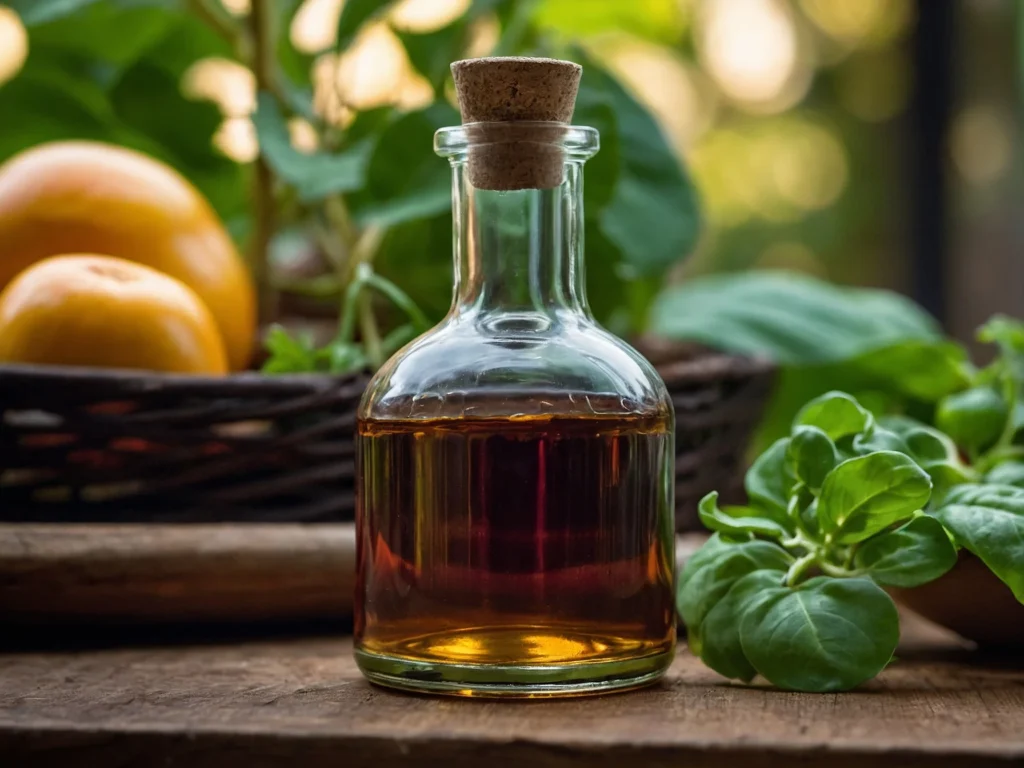Vinegar has long been a staple in kitchens worldwide, valued for its tangy and acidic taste that brings a bright pop of flavor to dishes. But did you know humble vinegar also has a remarkably versatile role in gardening and horticulture?

From controlling weeds to helping plants thrive, vinegar can be friend and foe to vegetation. Its acidity is powerful enough to eradicate unwanted plants, yet vinegar can nourish soil and protect valued plants when diluted and applied properly.
So what is the full story on vinegar and plants? Can vinegar discriminate in its effects between prized blooms and pesky weeds? Let’s deeply dive into the fascinating impacts vinegar can have in the garden.
A Brief History of Vinegar in Gardening
Before exploring vinegar’s effects on plants, it helps to understand that vinegar has had a place in gardens for centuries. As far back as 3000 BC, vinegar was used as a weed killer and pest deterrent, with records showing ancient farmers sprinkling diluted vinegar to protect crops.
Vinegar’s antibacterial properties have also been embraced in organic gardening and farming, providing a natural alternative to toxic chemical pesticides. Different types of vinegar have been finely tuned for horticultural use over generations of ingenuity and experimentation.
So while vinegar may seem like a modern hack for controlling weeds, it has ancient roots in agriculture and gardening. When used properly and judiciously, vinegar can be a safe, natural tool for nourishing and protecting plants.
Vinegar’s Effects on Plant Roots and Soil
Now let’s zoom in on how vinegar impacts vegetation, starting with its effects on plant roots and soil.
Can Vinegar Damage Plant Roots?
Being highly acidic, vinegar can potentially burn and damage plant roots and root hairs, which aid nutrient and water absorption. Excess vinegar can lower soil pH, disrupting beneficial microbial activity and nutrient availability.
However, when diluted properly and applied judiciously, vinegar poses little risk to plant roots and can even help nourish plants. Just a few tablespoons of vinegar per gallon of water provides enough acidity to benefit soil and roots without harm.
Improving Nutrient Availability
Adding a small amount of vinegar to soil can help activate nutrients like phosphorus, iron, and magnesium locked in alkaline soils with a high pH. This boosts their absorption by plant roots.
Promoting Root Growth
Mildly acidic soil also stimulates root growth as plants seek to stabilize pH. The key is using no more than 1-2 teaspoons of vinegar per gallon of water, spraying around plants, not on them.
So while direct contact with undiluted vinegar can damage roots, soil acidification with diluted vinegar offers benefits. When used carefully, it unlocks nutrients, stimulates growth, and creates a positive microbiome.
How Harmful is Vinegar to Different Plant Varieties?
Vinegar’s toxicity depends greatly on the type of plant being sprayed. When used improperly, vinegar can damage or kill vulnerable plants, so caution is needed.
Flowers
Many flowering ornamentals like roses, lilies, and hydrangeas are sensitive to vinegar and can sustain leaf burns and discoloration of blooms. Even dilute concentrations may cause cosmetic harm.
Vegetables
Robust garden vegetables like tomatoes, squash, and broccoli are more tolerant to diluted vinegar. But leafy greens like lettuce and spinach are still prone to leaf burns from overspray.
Trees and Shrubs
Mature trees and shrubs can withstand more aggressive vinegary weed treatments than smaller plants. But soil acidification at their base should still be minimal to avoid root damage.
Turf Grass
Vinegar is very effective at killing grass when applied directly in concentrations over 10%. But most turf grass will recover from light exposure to 5% household vinegar.
So vinegar tolerance varies. Delicate flowers and leafy greens require caution, while heartier vegetables, trees and grass can better withstand direct contact. But all plants are vulnerable to root damage from excessive soil acidification.
Is it Safe to Directly Apply Vinegar to Plants?
When used in appropriate dilutions and with care, vinegar can be safely applied directly to some plant surfaces for benefits:
Dilution is Key
Straight 5% household vinegar may scorch plant tissues, so dilute 1:3 or less with water. Even a 1:10 ratio provides antifungal and antibacterial activity.
Targeted Spraying
Spot treat affected areas on leaves and stems with a spray bottle for issues like powdery mildew. Avoid excessive runoff into soil.
Moss and Algae Elimination
Spray full-strength vinegar to safely remove moss and algae growing on walkways, patios, and gravel garden areas.
Insecticide
A 5% vinegar spray deters soft plant pests like aphids and mites for up to 3 days, an organic alternative to toxic pesticides.
So targeted, reasonable applications of diluted vinegar can benefit plants when applied carefully. But risks still exist, underscoring the need for caution.
Leveraging Vinegar as a Natural Weed Killer
Vinegar truly shines as an organic alternative to toxic herbicides like RoundUp for controlling weeds and grass. Let’s explore the ideal ways to harness vinegar’s weed-killing power.
Not All Vinegars Are Created Equal
White and apple cider vinegars contain 5-6% acetic acid, enough to kill young weeds and tender grass for household use. But horticultural vinegars are upgraded to 20% acetic acid for commercial-strength weed control.
Increase Concentration for Stubborn Weeds
Add 1 cup salt per gallon of vinegar to amplify effectiveness. The salt acts as a desiccant. Table salt works fine, but Epsom salts also provide beneficial magnesium.
Timing Matters
Apply vinegar weed sprays on warm sunny days for greatest impact. The heat maximizes vinegary burn. Young weeds are weaker and require just a 20% solution, while established weeds may need full-strength horticultural vinegar.
Direct Contact is Best
For permanent weed destruction, thoroughly coat all leaves and stems with vinegar spray. This prevents regrowth from unaffected roots. Repeat applications are likely needed for total eradication.
Till Remains into Soil
After weeds visibly brown and die, till the remains into the soil before replanting. This prevents regrowth and returns nutrients to the earth.
With the right vinegar, concentration, timing, and application, even the most stubborn weeds don’t stand a chance. Just take care to avoid overspray on valued plants.
Mitigating Mistakes When Using Vinegar in the Garden
Despite vinegar’s many benefits, it still carries risks requiring careful handling. Some common mistakes lead to plant damage:
Accidental Overspray
It happens to all gardeners – an errant squirt hits a treasured flower or vegetable. Gently wash leaves to limit damage and dilute soil. Monitor for signs of stress.
Excessive Concentration
Overdoing vinegar, even when diluted, can harm plant roots. Err on the side of weaker solutions. You can always increase strength as needed.
Little or No Dilution
Applying undiluted vinegar, even via sprayer, almost guarantees plant damage. Always dilute as a rule of thumb.
No Spot Testing
To check a plant’s tolerance before treating large areas, apply diluted vinegar to a few leaves. If minimal effect after a day, gradually increase strength.
Over-acidification of Soil
Avoid excessive vinegar use that can alter soil pH for extended periods. Test soil acidity annually and add lime if pH drops too low.
With careful dilution, application, spot testing, and soil monitoring, vinegar can be used safely. Correcting mistakes promptly also mitigates negative impacts.
Is Watering Plants with Vinegar Advisable?
While vinegar can be integrated into spray solutions, watering soil directly with vinegar is generally not recommended:
Can Harm Roots
Undiluted vinegar has a pH of 2-3. Excess acidification from watering with vinegar harms beneficial root fungi and microbes.
May Leach Nutrients
Highly acidic soil created by vinegar watering can leach vital nutrients like calcium and magnesium from soil.
Difficult to Control Concentration
It’s challenging to control how much acidification vinegar watering causes across your garden. Impacts may vary unpredictably.
Hard to Reverse Effects
If over-acidification of soil occurs, the only recourse is applying lime regularly to neutralize acidity, a lengthy process.
Safer Alternatives Exist
Watering with diluted hydrogen peroxide or compost tea provides benefits without as much risk of over-acidification.
So it’s generally wiser to use vinegar in targeted sprays and promote soil health via directly composting versus watering with vinegar. If choosing to water with a diluted vinegar solution, extreme care is needed in monitoring soil pH.
Embracing Vinegar’s Role in Natural and Sustainable Gardening
Commercial horticulture has seen a rise in specialized vinegars that allow gardeners to harness the power of this simple acid on a larger scale:
Horticultural Vinegar (20% Acetic Acid)
This concentrated form of vinegar approved for commercial use can kill weeds and brush down to the root. When used judiciously, it avoids the toxicity issues of systemic herbicides like RoundUp.
Organic Horticultural Vinegar
Made from plant-based acetic acid derived from corn, organic horticultural vinegar offers a sustainable option without synthetic chemicals. It controls weeds efficiently but naturally.
Herbicidal Vinegar
Some commercial herbicidal vinegars use additional acids like pelargonic for enhanced performance. These are more controversial from a safety standpoint and less sustainable.
Choose plant-based horticultural vinegar for organic, sustainable weed control without sacrificing performance when possible. Avoid overuse to prevent soil acidification.
Creative and Innovative Uses for Vinegar in the Garden
Versatile vinegar offers gardeners an array of creative new uses beyond weed control:
Natural Moss Killer
The acetic and citric acid in vinegar kills moss on walkways, patios, and roofing. Apply full strength and let sit before scrubbing away moss.
Eco-Friendly Driveway Cleaner
Mix 1 cup vinegar with 1/4 cup baking soda and add to 1 gallon of warm water. This solution removes oil stains from driveways without harsh chemicals.
Brush and Tool Cleaner
Soak dirty gardening tools overnight in undiluted vinegar to remove mud and debris, then scrub and rinse clean the next day.
Rust Remover
Spray full-strength vinegar on rusty garden tools, flower cages, and other items. Let sit for 1-2 days before scouring off rust.
With some imagination and experimentation, vinegar’s acidity and antibacterial power can tackle various unique gardening challenges. Just avoid applying these full-strength uses near valued plants!
Does Vinegar Control Plant Pests and Insects?
As a final benefit, vinegar repels some common plant pests when used in the following ways:
Ant Deterrent
Spray undiluted vinegar around ant nests or mounds to kill and repel ants from plants.
Soft-Bodied Insect Killer
Direct application of 5% acidity vinegar solutions kills and deters soft pests like aphids, mites, and whiteflies on contact due to chemical burns.
Fruit Fly Trap
Add a few drops of vinegar to jars of overripe fruit to lure and drown fruit flies.
For severe infestations, vinegar alone may not solve the problem. But it offers a helpful, natural supplement to integrated pest management practices for organic gardening.
Conclusion
As we’ve seen, vinegar possesses a complex duality in the gardening world. When used improperly or in excess, vinegar’s acetic acid can damage plants and create long-term issues in soil.
However, when properly diluted and applied carefully, vinegar can nourish plants while controlling pests and weeds. Horticultural vinegars expand these benefits for home and commercial growers alike.
The key to maximizing returns from vinegar while avoiding harm is an integrated approach:
- Use mild vinegar dilutions for plant nutrition
- Reserve higher concentrations for targeted weed control
- Embrace specialty horticultural vinegars for best performance
- Test applications on small areas first
- Monitor soil pH regularly
- Correct issues promptly to limit damage
From being a simple kitchen staple, vinegar emerges as a multifaceted player in the garden when handled carefully. This common and natural acid offers an array of sustainable solutions, adding a powerful plant ally to the toolkit of innovative gardeners.
